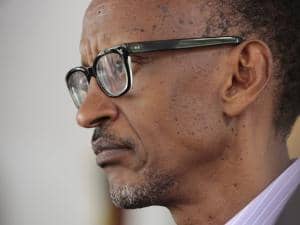Students of Stanford STAND are calling a protest Friday, April 25, 11 a.m., prior to Kagame’s speech at the Stanford Graduate School of Business 12-1 p.m. in CEMEX Auditorium – join them!
Editorial by The Tufts Daily, the independent student newspaper of Tufts University
Rwandan President Paul Kagame visited Tufts April 22 to give a speech to students and guests on his country’s recovery from genocide, ethnic tensions and its future. The lecture was so popular that tickets for the event were gone within an hour of their public release. While Jumbos should feel lucky that the university continues to bring in elite speakers, thinkers and media figures, it’s important to remain aware of Rwanda’s full story.

While Kagame’s Rwanda has seen marked improvement in representing women in its parliament – more than 60 percent of the body is made up of women – and in economic growth, his administration has still been accused of human rights abuses. The rebel group M23’s skirmishes and assaults in the eastern region of the Democratic Republic of the Congo (DRC) have been connected to the Rwandan government by the United Nations.
M23, which has only been the most recent militia group to contribute to the consistent troubles and instability in the DRC, represents one of the darker parts of Kagame’s tenure in a region where many ethnic Tutsis fled from Hutu massacres in Rwanda in the 1990s.
Domestically, according to Human Rights Watch, political and civil rights in Rwanda have been significantly curtailed under the Kagame administration. Human Rights Watch has accused the government, led by the Rwandan Patriotic Front (RPF), of “numerous cases of arbitrary arrests, detentions, prosecutions, killings, torture, enforced disappearances, threats, harassment and intimidation against government opponents and critics.”
An essay in the Wall Street Journal by Howard French titled “How Rwanda’s Paul Kagame Exploits U.S. Guilt” makes further accusations, examining Rwanda’s intervention into the DRC in 1996 (then Zaire) as a stepping stone for gaining influence in the country and alleging that Kagame’s administration has taken steps to imprison or otherwise eliminate political opposition to him and his party.
While it’s important to recognize the advancements made in Rwanda as significant and worthy of encouragement, Tufts students should not turn a blind eye to the numerous allegations and questions that hover over Kagame’s administration.
It is especially important that future policymakers among us carefully consider what he and his party have done before deciding to mark Rwanda and its leader as rising stars in a troubled region. Few stories are so guiltless, and Kagame’s Rwanda does not look to be entering into that small number.
This story first appeared on the website of The Tufts Daily.





